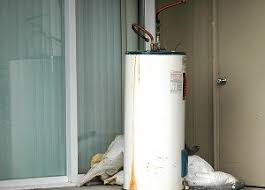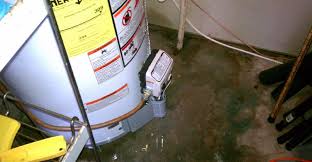The Dangers of Leaking Water Heaters
Water heaters generally operate well under most circumstances with regular care, maintenance and cleaning, but as with almost any home appliance, problems can occur. One such problem is if the water heater is leaking, either due to a corroded water tank, loose valves or even just condensation during particularly cold temperatures. Several dangers exist that are associated with a leaking water heater.
Potential Explosion
If the leak is caused by a buildup of water, it should be controlled by the temperature pressure relief valve, which is designed to release excess water when pressure builds up in the water heater. However, if the water temperature is set too high, the water pressure is too high or the relief valve is broken or damaged, the pressure may build up in the tank and the tank could explode.
Broken Heating Element
A leak on an electric water heater may be due to a damaged or broken heating element gasket. If the heating element is suspected, turn off the water and power and drain all water out of the water tank before replacing the gasket. Run hot water in a sink before turning the power back on to the unit to prevent further damage to the heating element.

Bad Water
If the leak around a water heater is due to a rusty pipe, there is additional danger to the water supply, as water that is exposed to rust may absorb bacteria and rust. This water will then be distributed throughout the home from the water heater, which exposes users to potentially harmful chemicals or bacteria in the water.
Property Damage
One of the most basic dangers of a leaking water heater is the damage to the surrounding floor and walls. This can lead to mold and can even seep down to the foundation of the home, which can ultimately weaken the foundation and lead to other problems. Any water around a water heater should be cleaned up thoroughly as soon as possible, and the area should be monitored well for potential mold or mildew that may grow as a result of water exposure.
RUSTY PIPES
If the pipes that lead to and from your water heater become rusty, then they may corrode to the point that water leaks through them. Not only does this affect your water heater, it also means that your potable water has potentially been compromised by bacteria and chemicals.

Is Your Water Heater Leaking?
Water heaters are known for propagating the illusion of a leak. Your water heater will typically have many other plumbing pipes, fixtures, and elements surrounding it that could be leaking. So before jumping to conclusions, clean up any standing water and closely examine the surrounding pipes and other plumbing elements close to your water heater. If the small puddle of water never returns, you have nothing to worry about because these puddles are generally caused by condensation. Water heaters and their surrounding parts are prone to condensation, which overtime, can gather and create a small puddle of water on your basement floor. However, if the puddle does consistently return and no sources can be identified, your water heater is most likely the cause of the leak.
Turn Off Power
Once you determine your water heater is the cause for a leak whether by close examination or a very obvious leak, it is recommended that you turn off the power supply to your water heater.
- How to Turn Off an Electric Water Heater
Go to your homes circuit breaker box and switch off the breaker for your electric water heater.
- How to Turn Off a Gas Water Heater
Located on your water heater there should be an on/off switch or dial controlling the power to your water heater.
Turn Off Water
Commonly set a 125° F, the water within your water heater is very dangerous and can result in serious injury from just indirect contact. It is very important that after turning off the power to your water heater that you turn off any water flow as well to ensure your safety. Turn off the cold water shut-off valve located just above your water heater as required by law. Be sure you can get to this valve safely if you have a major leak as it can result in serious burns and injuries. To avoid possible injury in the case of a significant leak, locate the main shut-off valve and close it to stop any water flow to your water heater.

Signs Your Water Heater Is Leaking
Some water heater leaks will be easily visible, with water spraying out of a valve or a crack in the tank. Others will be more subtle, and may be limited to a small puddle under the unit.Signs of a leaking water heater:
- A sudden lack of water coming through the fixtures in your home. It’s possible that the leak may have put out the pilot light, which would prevent the water heater from heating water.
- Water coming out of the temperature or pressure relief valve. This indicates that the temperature or pressure in your water heater has exceeded the safety limits, and should be addressed by a professional plumber.
- Standing water around the base of your water heater. Depending on the size of the puddle, this could indicate a pinhole leak or a major problem.
What is the Source of the Leak?
Loose Fittings and Connections
Commonly known as the cold water inlet and hot water outlet connection, these fittings and connections can be found attached to the top of your water heater. Fixing a leak here may simply require tightening the fittings and connections or inexpensively replacing the cold water inlet and hot water outlet connections.
Broken Temperature and Pressure or T&P Valve
Located on the side of your water heater with a pipe running straight to the ground, the T&P Valve exists as a safety mechanism in the event that the temperature or pressure (PSI) within your water heater exceeds the tanks allotted specifications. Check your T&P Valve for any leaks near its point of connection to your water tank. Additionally, if the T&P Valve is releasing water and steam it may be a faulty device or it might be working properly in which case you should adjust the pressure and temperature within your water heater. While this problem is easy to fix it is the most concerning and dangerous because a significant amount of excess pressure within your tank will cause the T&P Valve to release scalding hot steam and water.
Broken Drain Valve
Located near the bottom of your tank, the drain valve can leak due to use and deterioration overtime. It is easy to fix and not a serious concern. Check your drain valve for any leaks near its point of connection to your water tank.
The Tank Itself
If no other source can be identified on the outside of your water heater, it is mostly likely an internal problem. Internal problems within your water heater are generally cause by age and deterioration and result in water leaking from the bottom of the tank. The only fix to this problem is to replace your water heater with a new one.